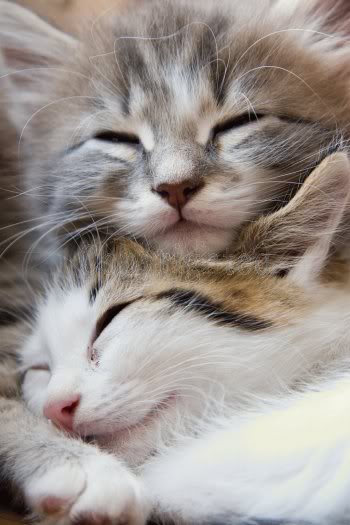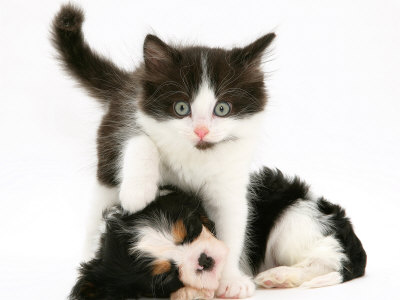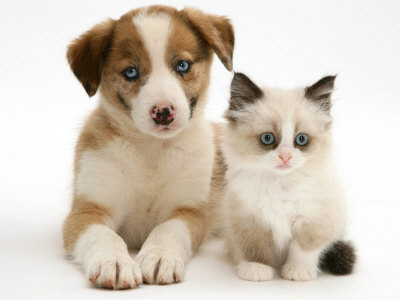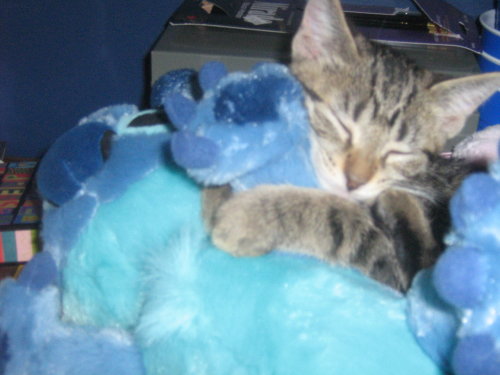FCKS develops usually in kittens around three days of age, and sometimes affects whole litters, sometimes only individuals or part of a litter. Kittens can go flat any time during early maturation, some flattening as late as 10 days of age or (in very rare cases) later. It is possible that the later-developing cases are due to Respiratory tract infection or pneumonia. Until 2010 FCKS was believed to be caused by a spasm in the intercostal muscles, but new data has led to the conclusion that flattening is caused by failure of the lungs to inflate normally or, when it occurs in older kittens, by lung collapse.
The condition causes weight-gain to halt, respiratory distress, inability to feed normally and, in a significant proportion of cases, death. However, since a significant percentage of kittens survive the condition immediate euthanasia is not indicated, and supportive treatments can be employed to increase the likelihood of survival (see Treatment, below).
The condition is often misdiagnosed as Pectus excavatum, with which it has no relation, although FCKS kittens may also have PE. Although the condition is believed to be more prevalent in the Burmese breed it is found in every breed of cat, including non-pedigree domestic cats, and the apparent prevalence in the Burmese is most likely due to better communication between breeders and reporting of the condition, as well as the naturally more barrel-shaped chest of this particular genotype. Since early reporting of the condition identified the Burmese as susceptible the Bengal breed, with a similar physiology, has emerged, and shows a similarly large number of FCKS kittens. The syndrome is life-threatening in a significant number of cases (possibly around 50-60%) mainly due to a lack of understanding of the underlying cause of the condition, and insufficient sources of information in veterinary literature.
In some cases (particularly where whole litters are affected) FCKS can be due to genetic factors: certain bloodlines are known to produce a preponderance of kittens with the condition, and close matings very commonly produce it in the offspring. Isolated cases are more likely due to environmental factors or slight prematurity of the kittens concerned.
It is possible that the lung collapse in neo-nates (i.e. around 3 days of age) could be due to a lack of surfactant - the coating of the inside of the lung that prevents the inner surfaces of the alveoli from sticking together. (Causes of surfactant deficiency are not discussed here, but the role of surfactant is discussed in a number of articles in the British Journal of Anaesthesia vol. 65, 1990.) Kittens are born immature in many ways, and full inflation of the lungs does not happen immediately, but takes place gradually over a period of several days after birth. Although a kitten may seem active and thriving, its lungs will not be fully inflated until approx. day 3 after birth. Thus if inflation fails to happen correctly the negative pressure in the chest cavity will cause the ribcage - which is extremely flexible - to collapse inward, dragged in by the lungs, and not collapsing due to muscular cramping, and compressing the lungs.
Later lung collapse may be due to lung infection, or possibly to a malfunction in the epiglottis, causing the in-breath to draw air into the digestive tract rather than the lungs. A short term malfunction of this sort may be perpetuated by the resulting colic creating a feedback loop that interrupts the correct breathing process.
Autopsy and analysis of lung aspirate in a group of flat-chested kittens bred by a US Vet showed the presence of Herpes virus. A kitten that has difficulty in breathing is very likely also to suffer from colic (which can cause weight loss in the early development of a normal kitten), and a very small daily (or twice daily) dose of liquid paraffin (one or two drops placed on the tongue of the kitten) should help to alleviate this problem. FCKS kittens who do not maintain weight are usually among the group which die, but many of them may simply be unable to feed properly due to colic, becoming increasingly weak and lethargic, and fading due to malnutrition as much as to the thoracic problems. Colic has many causes, but in a kitten with respiratory difficulty it is possible that a misfunction during the breathing process leads the kitten to swallow air instead of taking it into its lungs. The GI tract fills with air while the lungs do not receive a proper air supply, preventing them from inflating fully. Pressure from the stomach exacerbates the condition. Treating for colic with liquid paraffin seems to shorten recovery time from 4-10 weeks to a matter of days.
The condition causes weight-gain to halt, respiratory distress, inability to feed normally and, in a significant proportion of cases, death. However, since a significant percentage of kittens survive the condition immediate euthanasia is not indicated, and supportive treatments can be employed to increase the likelihood of survival (see Treatment, below).
The condition is often misdiagnosed as Pectus excavatum, with which it has no relation, although FCKS kittens may also have PE. Although the condition is believed to be more prevalent in the Burmese breed it is found in every breed of cat, including non-pedigree domestic cats, and the apparent prevalence in the Burmese is most likely due to better communication between breeders and reporting of the condition, as well as the naturally more barrel-shaped chest of this particular genotype. Since early reporting of the condition identified the Burmese as susceptible the Bengal breed, with a similar physiology, has emerged, and shows a similarly large number of FCKS kittens. The syndrome is life-threatening in a significant number of cases (possibly around 50-60%) mainly due to a lack of understanding of the underlying cause of the condition, and insufficient sources of information in veterinary literature.
 Kitten and puppy sleeping.jpg |  dog and cat cuddling together |  but SLEEPING TOGETHER, |  Pictures (49) |  Kittens and Puppies Playing |
 Puppies and kittens living in |  two-cute-sleeping-kittens |  The unlikely pair also sleep |  puppies and kittens sleeping |  He only wishes puppies from |
Later lung collapse may be due to lung infection, or possibly to a malfunction in the epiglottis, causing the in-breath to draw air into the digestive tract rather than the lungs. A short term malfunction of this sort may be perpetuated by the resulting colic creating a feedback loop that interrupts the correct breathing process.
 Kittens Sleeping Together |  Sleeping Cat and Dog |  Raising kittens and puppies |  Black-And-White Kitten Walking |  kitten and puppy |
Cute sleeping kitten. Lovely |  two-cute-kittens-sleeping |  puppy and kitten Kittens and |  puppies and kittens sleeping |  Kittens and Puppies |
No comments:
Post a Comment